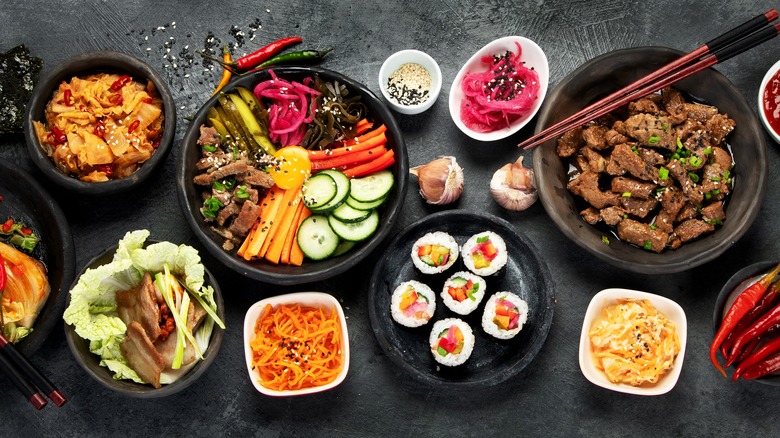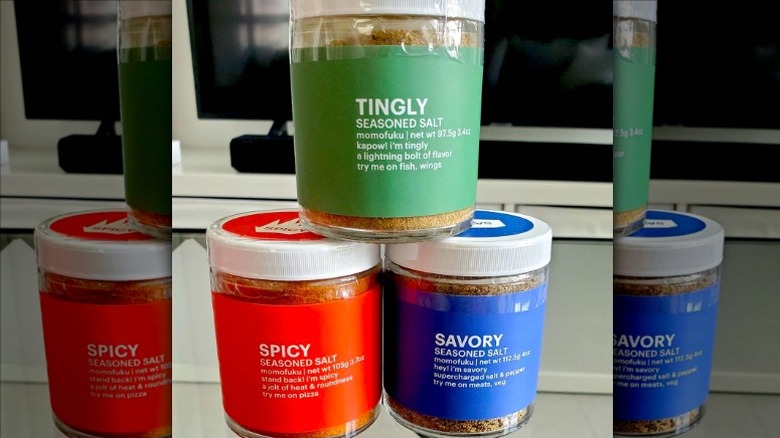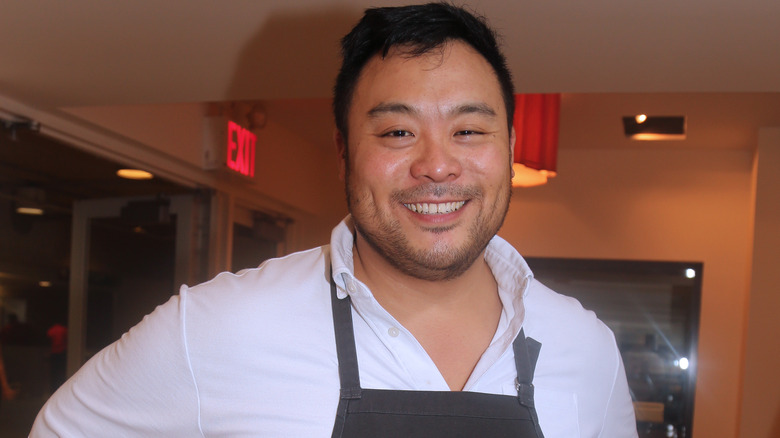What Makes Momofuku's Savory Salt So Delicious?
In 2004, David Chang opened Momofuku, a humble noodle bar in New York's East Village, where he worked in an open kitchen overlooked by diners. Nearly 20 years later, the Korean-American chef has built a global food empire with restaurants stretching from New York to Sydney, a cookbook series, and an online store selling things like chili oil and patterned table linens. What's more, his Momofuku Ko restaurant in Lower Manhattan has held two Michelin stars since 2009 (via JP Morgan Chase).
But what makes Chef Chang so successful? Partly his obsessive, forensic commitment to flavor. As he wrote in Wired, with every recipe he concocts, he's looking to give diners that ripple of pleasure you get when you taste something truly special. He describes his Momofuku pork buns as the first dish that earned this reaction, bringing peckish people to his door through pure word of mouth. That became his yardstick for success — a dish that people would actually line up for.
Then he noticed an odd pattern — every one of his hit dishes seemed to have some underlying, intangible principle at work, which he called his "Unified Theory of Deliciousness." So he got to work trying to identify these elusive principles of tastiness — its hidden rules and laws — through the Momofuku Culinary Lab. One result of this R&D kitchen has been the creation of three specialty salt seasonings, which are 10 years in the making.
The flavor element crucial to Momofuku's Savory Salt
The natural flavor-enhancing trio includes Spicy Seasoned Salt, Tingly Seasoned Salt, and Savory Seasoned Salt. As Chang explains on Momofuku's YouTube channel, Spicy delivers a satisfying heat hit that also has roundness, meaning it's more than a one-dimensional tongue burner. Tingly brings more "mouthfeel" into a dish, creating a visceral, almost numbing effect. And Savory? It's described as "supercharged salt and pepper" that's particularly good sprinkled over grilled meats, fish, and vegetables — yet you can use it any way you use seasoning (via Momofuku). But what is the secret of its deliciousness?
First of all, Momofuku's Savory Seasoned Salt contains kosher salt, pepper, garlic, onion, kelp, mushroom powder, and tamari. Those three latter ingredients in particular make this seasoning an easy shortcut to giving your food a concentrated umami punch. But it's not just the umami element that makes this seasoning so special — because it is, after all, a salt. And David Chang has his own particular hypothesis about this seasoning.
Has David Chang cracked the secret to perfect seasoning?
Any chef worth their (pepper?) knows how elementary salt is. One of the world's greatest chefs, Ferran Adrià of El Bulli, said that "Salt is the only product that changes cuisine. There's a big difference between food that has salt and food without it" (via AZ Quotes). But how much should one actually add to a recipe, as vague terms like pinch and sprinkle are usually indicating the amount? Is there a hidden universal law to salt?
As Chang explains in Wired, he decided to find out by doing exhaustive tasting tests of different ratios of salt to water. That's when he noticed something surprising — when a dish is perfectly seasoned, it simultaneously feels like it has too much and too little salt, as if it's teetering on a tightrope. He called this the "saltiness paradox" and set about replicating the effect in his own recipes and seasonings.
In other words, Chang knows how to season. And while most of us won't ever earn a PhD in his "Unified Theory of Deliciousness," we might still catch a glimpse of its principles in Momofuku's Savory Salt.


